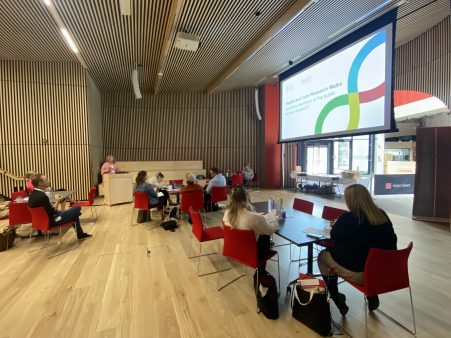RDCS Early Ideas Event 2022
17 November 2022
Earlier this summer, after more than two years of virtual events, the Research Design and Conduct Service (RDCS) South East Wales held its first in-person workshop since the beginning of the Covid-19 pandemic. The all-day event on “Developing an Early Idea for Research” was aimed at NHS staff interested in learning more about how to turn a vague idea into a research study with a view to applying for grant funding.

Nine delegates working across three Welsh Health Boards (Cardiff and Vale UHB, Cwm Taf Morgannwg UHB, Swansea Bay UHB) and Optometry Wales and a range of specialties (including pharmacy, optometry, radiotherapy, speech and language therapy, obstetrics and gynaecology) attended the workshop. It was held at Cardiff University’s brand new sbarc|spark Building where delegates were welcomed by RDCS Administrator Lorraine Craig who led the organisation of the event.

RDCS Director Sue Channon opened the day with an overview of the support the RDCS provides. Next, RDCS Consultants Claire Nollett and Kim Smallman presented on aspects of a good research idea, before delegates discussed their own ideas with amongst themselves and also with the RDCS Consultants. Next, Emma Langley, Public Involvement Coordinator at Health and Care Research Wales, shared some ideas around public and patient involvement in research, followed by small group discussions facilitated by Emma and the RDCS team and allowing delegates to explore how their own project ideas could benefit from public involvement.
After lunch (provided by independent catering outlet milk&sugar in sbarc|spark), RDCS Deputy Director Philip Pallmann introduced the PICO framework for formulating clear research questions, and once again delegates had the opportunity to craft their own PICO questions relating to their own ideas and receive feedback from the RDCS Consultants. Then, Kim and Philip took the delegates on a whistle-stop tour of study designs for qualitative and quantitative research projects, before the day was rounded off by a brief overview of available funding schemes.

The workshop received very positive feedback from delegates and an average satisfaction rate of 9.1/10 (based on 9 returned forms). Aspect that delegates praised in their feedback included:
- “Study designs explained clearly with practical examples, makes the concepts easy to digest”
- “Info on feasibility studies very useful as I’ve not been introduced to this approach before”
- “Using the PICO framework to work through ideas was very useful and brought up further questions and areas to look into”
- “Helpful to work through ideas and research questions with other people and have time to discuss”
- “Small group and breakout tasks to be able to ask more specific questions”
- “I found it really helpful to discuss ideas with the consultants who also signposted to other services”
- “I found the information on PPI very useful as this is something I had not considered”
- “Learning about different sources of funding e.g. for PPI involvement”
- “Really great presentations, so much enthusiasm from the presenters”
- “The food was great!”
- December 2025
- October 2025
- June 2025
- May 2025
- April 2025
- March 2025
- February 2025
- December 2024
- November 2024
- October 2024
- September 2024
- July 2024
- June 2024
- May 2024
- April 2024
- March 2024
- December 2023
- November 2023
- September 2023
- July 2023
- June 2023
- April 2023
- March 2023
- February 2023
- December 2022
- November 2022
- October 2022
- September 2022
- August 2022
- July 2022
- June 2022
- May 2022
- April 2022
- March 2022
- February 2022
- January 2022
- November 2021
- September 2021
- July 2021
- June 2021
- May 2021
- March 2021
- February 2021
- December 2020
- November 2020
- September 2020
- August 2020
- July 2020
- January 2020
- December 2019
- October 2019
- September 2019
- July 2019
- June 2019
- May 2019
- April 2019
- February 2019
- December 2018
- November 2018
- October 2018
- September 2018
- August 2018
- July 2018
- June 2018
- May 2018
- April 2018
- March 2018
- December 2017
- October 2017
- August 2017
- July 2017
- June 2017
- May 2017
- April 2017
- March 2017
- February 2017
- January 2017
- December 2016
- October 2016
- August 2016
- June 2016
- April 2016
- March 2016
- February 2016